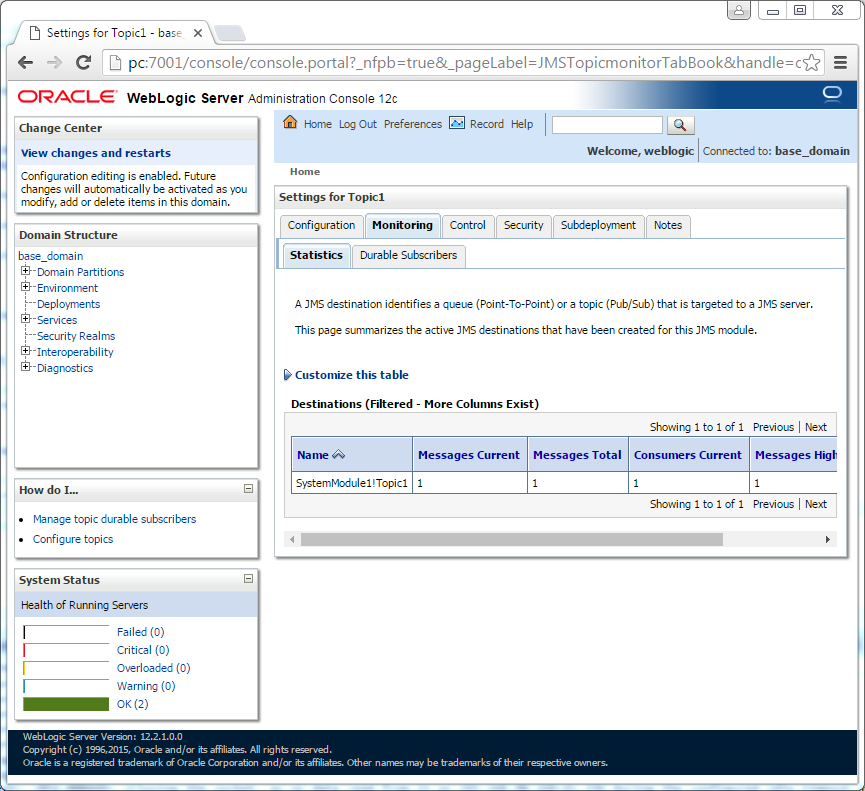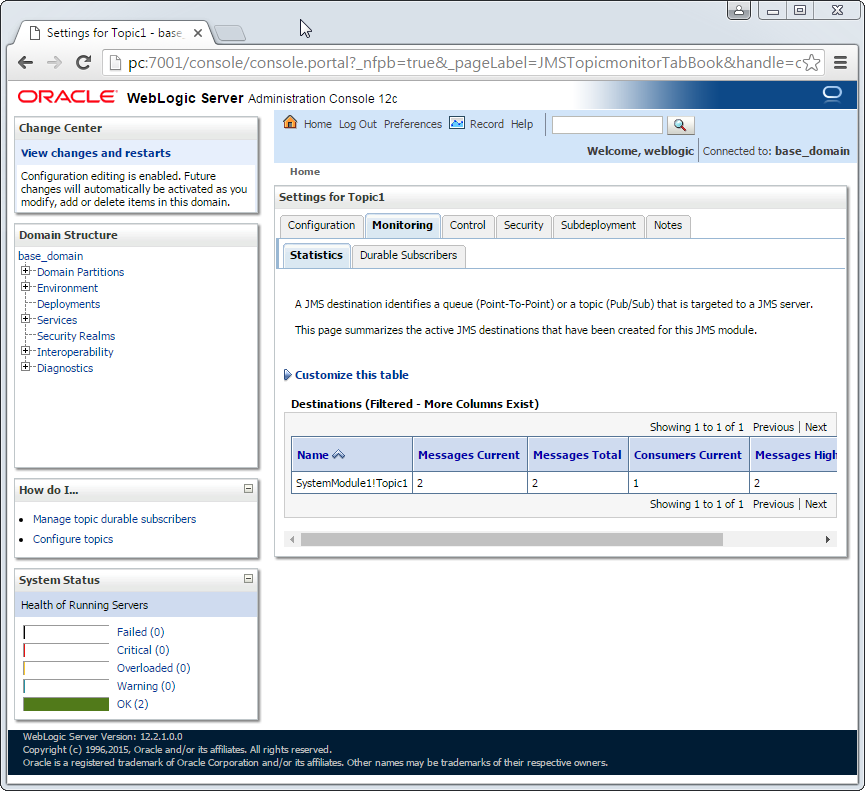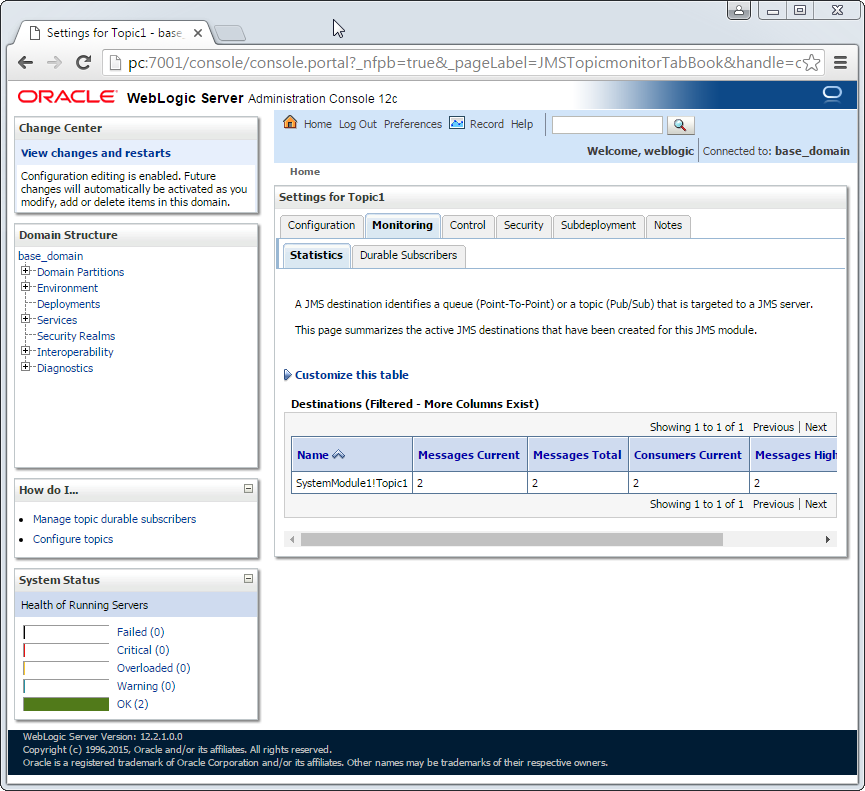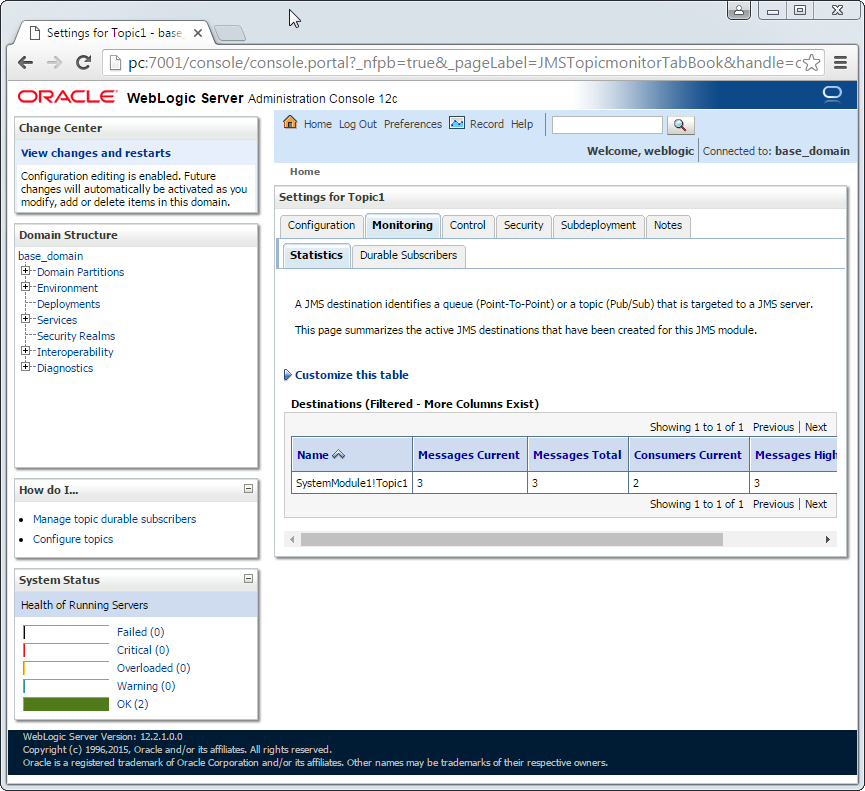#
Subscribe to a Topic using MessageListener (II)
This tutorial explains to you how we can read messages from a topic with Java using a MessageListener.
For testing the code I used a WebLogic Application Server. The code I created in Java connects to the WebLogic Topic
and listen/ read for incoming messages. This code acts as a Topic Subscriber. This behaviour is when we have
a Durable Subscriber defined on the Topic and you are connected to the Topic using a non-durable subscriber written in Java.
In my case I used a WebLogic Topic. Here is a picture showing the Topic with 1 message received and 1 Consumers
waiting for messages (the Durable Subscriber).

A new message arrive to the topic, but the Durable Subscriber is not listening to the topic:

After the Topic Listener is started, you can see that 2 Consumer are waiting for messages (the Durable Subscriber is sleeping/ not listening):

When a message is received you will see that:

For testing, I used the following: Eclipse, JDK 8, a WebLogic Server 12c and I created a Web application using JSF (PrimeFaces).
On a JSF page (.xhtml) I put a button to subscribe (read) the message from the WebLogic Topic:
<h:form>
<p:commandbutton value="Start Subscriber Listener" actionlistener="#{subscriberListener.readMessages}">
</p:commandbutton>
</h:form>Here is the SubscriberListener.java file :
package com;
import java.util.Hashtable;
//import javax.faces.application.FacesMessage;
import javax.faces.bean.ManagedBean;
//import javax.faces.context.FacesContext;
import javax.faces.event.ActionEvent;
import javax.naming.*;
import javax.jms.*;
@ManagedBean (name = "subscriberListener")
public class SubscriberListener {
// Defines the JNDI context factory.
public final static String JNDI_CFACTORY="weblogic.jndi.WLInitialContextFactory";
// Defines the JMS context factory.
public final static String JNDI_JMS_CFACTORY="ConnectionFactory2";
// Defines the topic.
public final static String JNDI_JMS_TOPIC="jndi/Topic1";
//The port is for the Managed Server
// or Admin Server where the JMS Server is running.
public final static String WebLogicURL="t3://pc:7004";
public void readMessages() throws Exception {
//1)Create and start connection
Hashtable env = new Hashtable();
env.put(Context.INITIAL_CONTEXT_FACTORY, JNDI_CFACTORY);
env.put(Context.PROVIDER_URL, WebLogicURL);
InitialContext ic=new InitialContext(env);
TopicConnectionFactory f=(TopicConnectionFactory)ic.lookup(JNDI_JMS_CFACTORY) ;
TopicConnection con=f.createTopicConnection();
con.start();
//2) create topic session
TopicSession ses=con.createTopicSession(false, Session.AUTO_ACKNOWLEDGE);
//3) get the Queue object
Topic t=(Topic)ic.lookup(JNDI_JMS_TOPIC);
//4) Create TopicSubscriber object
TopicSubscriber subscriber=ses.createSubscriber(t);
//5) create listener object
MyTopicListener listener=new MyTopicListener();
//6) register the listener object with receiver
subscriber.setMessageListener(listener);
//subscriber.setMessageListener(null); --> stop the Listener
}
}Here is the MyTopicListener.java file:
package com;
import javax.jms.*;
public class MyTopicListener implements MessageListener {
@Override
public void onMessage(Message msg) {
try{
String msgText;
if (msg instanceof TextMessage) {
msgText = ((TextMessage)msg).getText();
} else {
msgText = msg.toString();
}
System.out.println("The following message was read by a subscriber:" + msgText );
} catch(JMSException e)
{System.out.println(e);
}
}
}Info
This Java code creates a non-durable subscriber which will read the WebLogic Topic.

